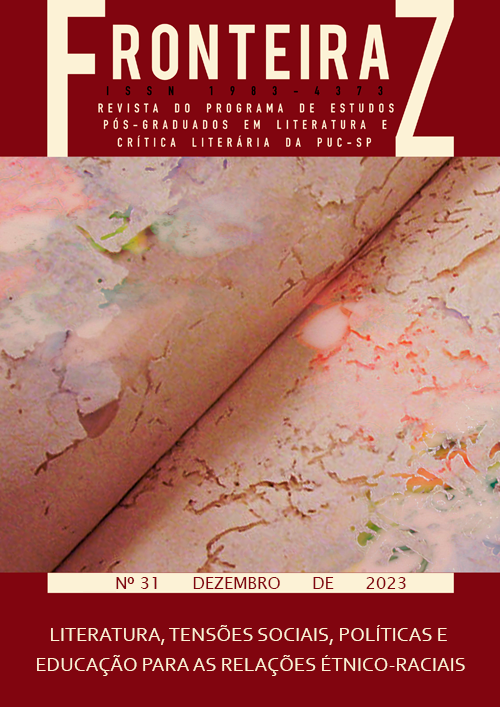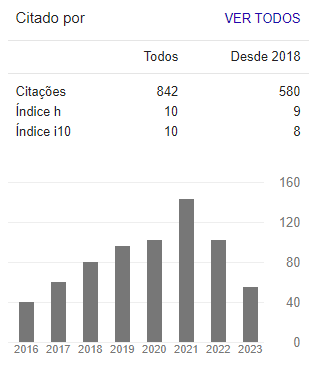The representation of black women in brazilian literature
a reading of Jarid Arraes’ cordels
DOI:
https://doi.org/10.23925/1983-4373.2023i31p5-25Keywords:
Women's writing, Representation, Black Heroines, Protagonism, Jarid ArraesAbstract
This study has as it’s objective to analyze two cordels, integrated in the work Heroínas negras brasileiras em 15 cordéis, by author Jarid Arraes, which brings a counter discourse to the inferior roles given to two black women in brazilian literature, namely "Carolina Maria de Jesus" and "Maria Firmina dos Reis". In this work, Arraes (2021) deconstructs, through 15 cordels, some stereotyped representations that were associated to women in literature, using the bias of black female protagonism. The analysis perspective of this research was conducted based on the theory of intersectionality proposed by Collins and Bilge (2020), while the theoretical foundation was build from reflections proposed by Zolin (2009), Evaristo (2005), Perrot (2007), among others. Through artistic, social and literary value that the respective work presents, we conclude that she can provoke important reflections on the erasure and silencing of black women in literature, especially for the school enviroment.
References
ABREU, M. Histórias de cordéis e folhetos. Campinas: Mercado de Letras, 1999.
AKOTIRENE, C. Interseccionalidade. São Paulo: Jandaíra, 2023.
ALMEIDA, S. Racismo estrutural. São Paulo: Pólen, 2019.
ALVES, W. F.; WANDERLEY, N. de A. Folhetos nordestinos vestidos de saia: a escrita da cordelista piauiense Ilza Bezerra. Jangada: crítica| literatura| arte, [s. l.], v. 10, n. 2, p. 6-31, 2023. Disponível em: https://www.revistajangada.ufv.br/Jangada/article/view/442. Acesso em: 17 nov. 2023.
ARRAES, J. Heroínas negras brasileiras em 15 cordéis. São Paulo: Pólen, 2020.
BRANCO, L. C. O que é escrita feminina. São Paulo: Brasiliense, 1991.
COLLINS, P. H.; BILGE, S. Interseccionalidade. Trad. Rane Souza. São Paulo: Boitempo, 2020.
DALCASTAGNÈ, R. Literatura brasileira contemporânea: um território contestado. Vinhedo, SP: Horizonte, 2012.
DUARTE, E. Por um conceito de literatura afro-brasileira. Terceira margem, Rio de Janeiro, v. 14, n. 23, p. 113-138, 2010. Disponível em: https://revistas.ufrj.br/index.php/tm/article/view/10953. Acesso em: 5 dez. 2022.
ESCALEIRA, B. Jarid Arraes: cordel que empodera mulheres. AzMina, [s. l.], 26 jan. 2017. Disponível em: https://azmina.com.br/colunas/jarid-arraes-cordel-que-empodera-mulheres/. Acesso em: 17 nov. 2023.
EVARISTO, C. Da representação à auto-apresentação da Mulher Negra na Literatura Brasileira. Palmares: Cultura Afro-Brasileira, Brasília, n. 1, p. 52-57, 2005. Disponível em: https://www.palmares.gov.br/wp-content/uploads/2011/02/revista01.pdf. Acesso em: 17 nov. 2023.
EVARISTO, C. Literatura negra: uma poética de nossa afro-brasilidade. Scripta, Belo Horizonte, v. 13, n. 25, p. 17-31, 2009. Disponível em: http://periodicos.pucminas.br/index.php/scripta/article/view/4365. Acesso em: 17 nov. 2023.
HAURÉLIO, Marco. Literatura de cordel: do sertão à sala de aula. São Paulo: Paulus, 2013.
JESUS, C. M. de. Antologia pessoal. Rio de Janeiro: UFRJ, 1996.
JESUS, C. M. de. O quarto de despejo. 10. ed. São Paulo: Ática, 2014.
JESUS, J. G. de. Resgatar nossa memória. In: ARRAES, J. Heroínas negras brasileiras em 15 cordéis. São Paulo: Seguinte, 2020.
NOGUEIRA, A. Revendo criticamente a tradição: uma leitura de cordéis de Jarid Arraes. In: LIMA, S. (org.). No desfolhar dos folhetos: escritos sobre cordel. Macapá: UNIFAP, 2021.
PERROT, M. Minha história das mulheres. São Paulo: Contexto, 2007.
REIS, M. F. dos. Úrsula e outras obras. Brasília: Câmara dos Deputados: Edições Câmara, 2018.
TELLES, N. Escritoras, escritas, escrituras. In: PRIORE, M. D. História das Mulheres no Brasil. 7. ed. São Paulo: Contexto, 2004.
ZOLIN, L. O. Literatura de autoria feminina. In: BONNICI, T.; ZOLIN, L. O. (org.). Teoria literária: abordagens históricas e tendências contemporâneas. 3. ed. Maringá: Eduem, 2009.
Downloads
Published
How to Cite
Issue
Section
License
Copyright (c) 2023 FronteiraZ. Journal of the Postgraduate Studies in Literature and Literary Criticism Program

This work is licensed under a Creative Commons Attribution-NonCommercial 4.0 International License.







 Este obra está licenciada com uma Licença
Este obra está licenciada com uma Licença 